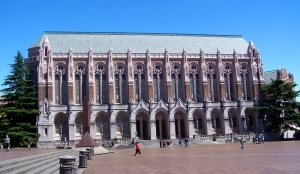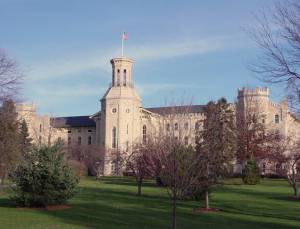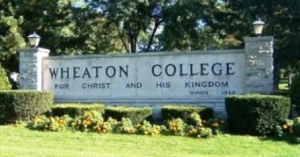These are difficult days at Wheaton College, dark, discouraging days. A storm broke over our heads last December. It erupted when our colleague, Dr. Larycia Hawkins, posted comments online that some readers interpreted as equating Islam and Christianity. It intensified when the college’s administration first suspended Dr. Hawkins, then announced that it would seek to dismiss her from the faculty. Perhaps an end is now in sight. Over the weekend the administration announced that it was withdrawing its request to terminate Dr. Hawkins and then disclosed that Hawkins and the administration had mutually agreed to “part ways.” How these steps will be received—what they will mean to faculty, staff, students, alumni, and the larger world—is an open question.
What is certain is that the controversy has exacted a heavy toll. For the past two months we’ve been besieged left and right. Liberal detractors have denounced Wheaton’s fundamentalism and Islamophobia, even as conservative critics lamented the school’s surrender to theological liberalism and political correctness. “Woe to you when all men think well of you,” Jesus said. At least we don’t have to worry about that.
Just as sloshing a coffee cup reveals what’s inside it, the stress and strain of the controversy has shown the world the truth behind our admissions brochures. We’re a fallen institution staffed by fallen men and women. More precisely, we’re sinners—to use an unpopular term—and I’m the chief of them. As a recent speaker on our campus put it, it’s wholly fallacious to think that we’re in the business of receiving innocent Christian teenagers (they’re not) with the goal of preserving their innocence (we can’t). Instead, we’re a community committed to joining a two-thousand-year-old conversation about the meaning of the claim that “Jesus Christ is Lord.” Together, we explore the implications of that declaration, both for our innermost selves and for the way that we engage the world. Yes, we are fallen, but our calling is high and wonderful, and the opportunity to pursue it is unspeakably precious.
That is why I love Wheaton College.
I don’t love it because it’s perfect. (See above.) And I’m not saying that I love it at this moment in order to make a point about who’s been right in the current controversy. I’m making this declaration—I feel compelled to make it—because I’m sick at heart and I’ll burst if I stay silent. Too much recent criticism of the college goes beyond the matter at hand to call into question Christian education more generally. In reply, I want to follow the example of generations of evangelicals before me and share my testimony. I use the term advisedly. What follows isn’t a systematic argument about the pros and cons of Christian education. I’m just going to testify to my experience. You can make of it what you will.
You should know that my perceptions of Wheaton College are inseparable from the twenty-two years that I spent at the University of Washington before coming here. William Faulkner is famous for observing that “the past is never dead. It’s not even past.” More poetically, in Intruder in the Dust, one of Faulkner’s characters explains, “It’s all now you see. Yesterday won’t be over until tomorrow and tomorrow began ten thousand years ago.” Faulkner meant that we never meet the present in pristine purity. The past is ever with us, shaping who we are, what we notice, how we see. Surely my story bears this out. Every day that I come to work, I see and feel and experience Wheaton in the light of my time in the secular Academy. How could it be otherwise? It was in the secular Academy that I first learned to think, to research, to teach and to write. It was there that my sense of vocation was originally conceived and nurtured. And it was there, above all, that I developed a longing for a kind of education that the secular Academy could never deliver.

The University of Washington’s “Cathedral of Learning,” Suzallo Library. I had a private study on the library’s fifth floor.
As I reflect on it, my time at the University of Washington divides neatly into two periods. The first was the tenure-track years, when my highest priority was not to think about my job but to keep my job. If you’re not familiar with the process, most colleges and universities give their new full-time faculty six years or so to earn tenure, and if they fall short of the institution’s standards, they’re sent packing. You’ll probably think that’s more than generous if you earn your living in the business world, where employees are regularly fired or laid off with short notice. The difference is that in the academic world—in large part because of the tenure system—job turnover and new job creation is minimal. Professors who are denied tenure rarely find other academic positions. You don’t start over at another school. You start over in another line of work. And if you’ve already spent six to eight years (or more) toiling on a Ph.D. and another six years of 60-70-hour work weeks as an assistant professor, you can understandably conclude that you’ve just wasted a good part of your life. The stakes are enormous, and that has a way of keeping you focused.
At the time, I would have described these years primarily in terms of their intensity. Now, I remember them more as a period of sleepwalking and inertia. With little self-awareness, I jumped onto the academic treadmill and did what the Academy asked of me. It wasn’t unpleasant. I benefited from UW’s exceptional resources, worked with bright students, and learned from supportive colleagues. And if you had asked me during those years, I would have said that I was being faithful to my calling as a Christian university professor. I was teaching a college Sunday School class, occasionally witnessing to unbelieving students, and (as a good Southern Baptist) saying “no” to wine at faculty parties. Above all, I was pursuing excellence in my field, loving God with my mind by pressing toward the prize of tenure, promotion, and professional recognition.
Or so I thought. And then I got tenure.
Isn’t it funny how God can expose the emptiness of our ambitions by fulfilling them? In the spring of 1994 I received two momentous pieces of mail almost simultaneously, and in tandem they changed the direction of my life. First, I received an advance copy of my first book, soon to be published by Cambridge University Press. It was pretty typical of first books that begin life as doctoral dissertations. It was deeply researched but narrowly focused. Specialists praised it—it won two professional book prizes—but almost no one else could understand it or desired to. Worse, there were no eternal issues in its pages, no engagement with Permanent Things, no grappling with questions of importance to my local church or to the broader community of faith. It was of the Academy, to the Academy, and for the Academy.
And the Academy, for its part, said “Well done, good and faithful servant! Enter into the joy of your lord.” That same week I received formal notification from the UW trustees that I had been promoted and granted tenure. The real decision on my tenure application had been made much earlier—once Cambridge had offered me a book contract the outcome was certain—but there was still something symbolically jarring about receiving the book and the promotion letter in the same week. I weighed these two “successes,” figuratively holding one in each hand and reflecting on what my university chose to value and reward. What I felt wasn’t elation, or affirmation or gratification, but a profound sense of emptiness. I was thirty-three years old, at the salary I was earning I knew I would have to work until I died, and I couldn’t imagine being able to continue for much longer.
Humanly speaking, I was experiencing what academics know as the post-tenure letdown. It’s so common that it’s become a cliché, so I don’t pretend for a moment that my experience was unique. But I believe that God used this time of discouragement and searching to help me think critically and deeply—really for the first time—about the pluralistic multiversity of which I was a part. I began to read—more enthusiastically than systematically—about the relationship between the love of God, the life of the mind, and the nature of true education. And as I did so, I began to see the university with new eyes. Then I began to see myself with new eyes, as I realized how effectively the Academy had shaped me into its mold.
Peter Kreeft writes that our culture wants us to be “well-adjusted citizens of the Kingdom of This World.” Through years of osmosis, I had come to be a well-adjusted citizen of the Academy. It didn’t strike me as odd that the university had no cohering vision, that it denied the unity of truth, that it sought to expand knowledge while ignoring wisdom. I swallowed the Academy’s claim that it was ideologically neutral. Most troubling, I accepted as natural its compartmentalization of religious belief, with the attendant assumption that we can understand vast domains of human experience without reference to God.
I began to see these things, little by little, in the years following my promotion and tenure. This wasn’t a Damascus Road experience—no scales suddenly fell from eyes. It was more like coming out of anesthesia, a gradual awakening to reality. And like a patient just out of surgery, my discomfort increased as the anesthesia wore off. As I began to see my surroundings differently, I also began to experience what Harry Blamires called “the loneliness of the thinking Christian.”
My Christian friends in Seattle regularly assumed that life was hard for a Christian professor in a place like the University of Washington, and they were right, but not for the reasons they supposed. They imagined that the environment was openly hostile to believers and figured that I must be the target of ostracism or even persecution. That was never my experience. Oh, there were continual reminders that I wasn’t in church: the student government association distributing “condom grams” in honor of Valentine’s Day, drag queens performing in the library courtyard (for course credit, no less), the school newspaper proclaiming “Jesus Should Have Been Aborted,” the department colleague who was a transvestite, to mention a few.
Such things were disturbing, but it’s not like I’d been unaware of them earlier. What distressed me far more were the limitations that I faced in the classroom. I hadn’t felt them when I first arrived at UW fresh from grad school. My primary goal was to help students understand the past on its own terms and largely for its own sake. And because they typically came to the university with pretty simplistic historical views, I would inevitably explode many myths that they harbored and complicate their understanding both of the past itself and of the craft of the historian. In the process, I was quick to assure them, I would also teach them critical thinking skills that would help them land good-paying jobs at Boeing or Microsoft or Amazon.
And then my sense of vocation began to change, in large part because of the reading I was doing about the nature of true education. I came to believe that my highest goal was not to help my students make a better living, but to help them wrestle with what it means to live well. I came to believe that authentic education is not the same thing as vocational training (important though that is), that it is a transformative experience that changes who we are. And as I began to take that goal seriously, I began to struggle with an ever increasing sense of futility.
In his 1947 meditation The Abolition of Man, C. S. Lewis wrote that “the pressing educational need of the moment” was not primarily to debunk our students’ unsubstantiated convictions. “The task of the modern educator,” Lewis maintained, “is not to cut down jungles but to irrigate deserts.” Lewis’s challenge both inspired and depressed me. Every day I taught students who had learned at the university that it was not necessary to have a consistent philosophy of life, that rationality was a “western construction,” that ideas were merely “convenient perceptions” and moral claims only rationalizations for self-interest. And because of the authoritative rules of the secular Academy, when those students came into my classes, I was free to pose religious questions to them but never answer them authoritatively. I was allowed to introduce religious perspectives to them but never endorse one above the rest. I could demonstrate the contradictions of particular belief systems but never proclaim the good news of a consistent alternative. In sum, if I was going to irrigate deserts at UW, I would have to do so without ever testifying to the “the fountain of living waters” (Jeremiah 2:13).
This was frustrating, as well as profoundly alienating. I never really felt alone as a Christian in the secular university until I began to try to think like one. As I did, I came to see myself, as Blamires put it, as “caught up, entangled, in the lumbering day-to-day operations of a machinery working in many respects in the service of ends that I rejected.” And so, by the year 2000, I had begun to pray for an opportunity to teach in a different setting built on a firmer foundation. A decade later, God answered that prayer.
I’ll be back with Part Two in a few days.


